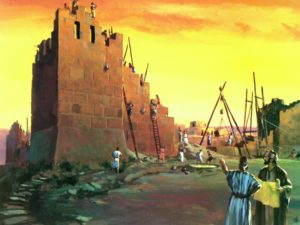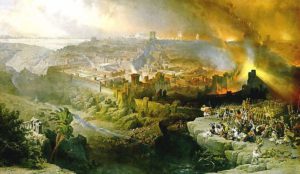In Lesson 9 we begin to encroach upon less familiar waters in the Bible history. That is to say, the Divided Kingdom Period is not as well read and studied by the average Christian. Many have heard of Abraham, but far fewer could relate the tale of Jehu from the book of 2 Kings. Pull up a chair and let’s discover the fascination of this period from Israel’s history!
Introducing the Divided Kingdom Period
This biblical period can be elusive to the modern reader’s imagination because it is organized in broken pieces throughout the Old Testament. The period can be found in the following books of history (1 Kings 12 – 2 Kings 17 & 2 Chronicles 10-29). That’s simple enough right? But the average Christian may not realize that most of the prophetic books are also written by men who lived during this time period of Israel’s history: Isaiah, Jeremiah, Hosea, Joel, Amos, Jonah, Micah, Nahum, Habakkuk, Zephaniah, and possibly Obadiah. Wow! That’s a large portion of the Old Testament. Here is a boiled down serving of this vast period.
Solomon has a son named Rehoboam (1 Kings 12). Rehoboam reigns around 930 B.C. During his reign the unified nation of Israel splits in half. Jeroboam leads a rebellion and becomes king of the 10 northern tribes, collectively they are called Israel. Rehoboam continues to be king but only over the 2 remaining southern tribes; together they are called Judah. The history of the divided nation ends with Israel being destroyed by the savage Assyrian Empire (722 B.C.) and Judah later being ransacked by the more domineering Babylonian Empire (586 B.C). Kings and Chronicles give histories of the divided kingdom leading up to each captivity, while the prophets listed above write warnings of impending, divine judgment tempered by promises of future hope and restoration. The next two Five Minute Bible Studies will cover the Assyrian Period and the Babylonian Period. In the mean time, Lesson 9 seeks to establish the importance of this history within the larger context of scripture and redemption.
What You Need to Know
The Davidic Covenant- God made a special covenant with David in 2 Samuel 7:10-16. This is THE most important passage of Scripture since Genesis 12:1-3!
“I will set up your seed after you, who will come from your body, and I will establish his kingdom…forever,” (2 Samuel 7:12-13)
Here, God combines the seed promise of Genesis 3:15 with the land promise of Genesis 12:1 and the king promise of Genesis 49:10. The pathway for redemption keeps getting more and more narrow- Abraham, Judah, and now David. David was the first descendant of Judah to ever be king. Perhaps Israel thought David was the Messiah at one point, but as Lesson 8 revealed, neither he or Solomon had the moral integrity to be the Messiah. Nonetheless, this covenant leads Israel to become giddy with teenage girl excitement each time a son of David assumes the throne. Maybe this son is the one!
The Measure of a King– The measure of a faithful king was the Mosaic covenant. If the son of David was entirely faithful to the covenant renewed by Moses in the book of Deuteronomy, then he would be the one to crush Satan’s head with a death blow (i.e. Gen. 3:15). This is what David taught Solomon at bedtime…
“Keep the charge of the Lord your God: to walk in His ways, to keep His statues, His commandments, His judgments, and His testimonies, as it is written in the Law of Moses…that the Lord may fulfill His word which He spoke concerning me,” (1 Kings 2:3-4)
Kings and Chronicles then becomes a narrative history of Israel and Judah’s kings. At the end of each king’s reign, there is frequently a summary statement describing the king and his reign. If the king is unfaithful to the covenant the author says something like, “He did evil in the sight of the Lord, and walked in the way of Jeroboam…” (1 Kings 15:34). If the king is faithful to the covenant the author author might rather say, “Now before him there was no king like him, who turned to the Lord with all his heart, with all his soul, and with all his might, according to all the Law of Moses…” (2 Kings 23:25). At the end of the day he was either like Jeroboam or he was like David. Unfortunately, both historical books end and no Messianic king has come. Every single king fails in some way, great or small. The more time passes and the more threatening that Assyria and Babylon become, the more hope and redemption slowly shrivels away. Israel needs a perfect, upright king who keeps the covenant and rules with a right hand of righteousness. In 700 B.C. the cry of Israel was, “Come Son of David!” In 30 A.D. the Canaanite woman’s cry was, “Have mercy on me, O Lord, Son of David!” (Matthew 15:22). Has he come or do we look for another?
Conclusion– Read the books of Kings and Chronicles with attention given to the preservation of David’s lineage, the kings of Judah. Notice how none of the kings of Israel are good, absolutely none. Likewise, notice how much attention is devoted to those kings of Judah that are good. Chronicles focuses on only Judah’s kings, gives priority to the kings that restored the temple, and builds a positive expectation for a future king that fits this mold. All glory to Jesus the Messiah who sits on the heavenly throne of David at this very moment in time. Maranatha!




Comments
Nice job!!
Very good.
Thank you so much for a clear understanding. I have just listened to 1 and 2 Kings. And before that of course I listened to 1 and 2 Samuel. I am going to Chron’s next. I can see the marvelous plan of God and of redemption through OT events and personalalities. I love history especially bible history. But you have made certain things very clear. Thank you. God bless.